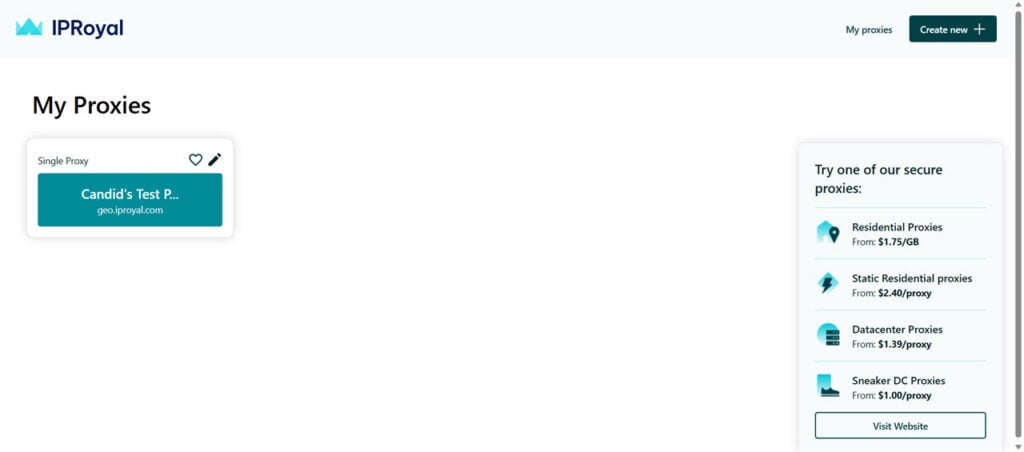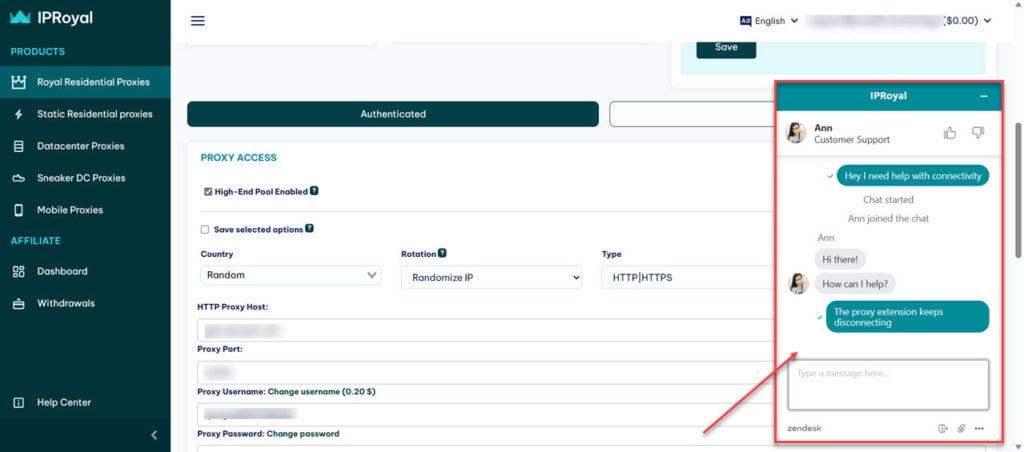⚠ We may earn a commission if you buy something from a link on this page. Thanks for your support.
When it comes to anonymising your digital footprint, there are a lot of methods you can use. VPNs are one of the most popular and easy-to-use solutions for relatively cheap. Still, proxies are also getting increasingly accessible and might help you save a buck.
Using a proxy isn’t as complete a solution as a VPN per se, but the integration with just about anything, especially if you’re a developer trying to test your command line bots or services from different locations. Also, if you’re web scraping, a proxy is a far better solution than a VPN.
That said, while IPRoyal’s pricing and services are competitive enough to be a serious problem to their competitors, the service does come with a few compromises.
What is IPRoyal?
Before the review, let’s look at what IPRoyal has to offer. The United Arab Emirates-based service started in 2020 and initially only offered proxy services to enterprises, but later switched and started selling directly to individuals. It currently offers four different types of proxy servers.
- Residential and static residential proxies (also available as private proxies)
- Data centre proxies
- Mobile proxies (currently only available for Lithuania, US and the UK)
- Sneaker DC proxies
IPRoyal claims to have over 8,056,839 proxy IP addresses worldwide with 99.9% uptime. The service can seem slightly complicated if you’ve never used proxies. However, they’ve got loads of helpful tutorials on their website and a handy Chrome and Firefox extension to help you get started relatively easily.
Also read: VPN vs Proxy: Brief comparison
IPRoyal Proxy review
As mentioned before, IPRoyal offers four proxy IP pools. We’ll be going over all four of those in this review.
Residential proxies
According to their site and marketing material, IPRoyal’s residential proxy pool contains over two million IP addresses from 195 countries. While that might seem like a lot, it’s still behind mainstream competitors like SOAX, Oxylabs and Bright Data in sheer numbers.
However, when it comes to performance, IPRoyal’s residential proxies will get the job done for you, albeit with a few hiccups here and there. The purchase and setup experience will be slightly complicated if you aren’t the sharpest with tech, but their browser extensions make it easy to get everything up and running.

You also have the option to switch between static, dynamic and sticky IPs. Sticky IPs can change between one second to seven days, so you’re covered on that front. As for the proxies, users can choose between HTTP, HTTPS and SOCKS5 security protocols.
You get a reasonably large IP pool from almost every country in the world, and all of them will give you good speeds. Of course, this also relies on how fast your internet connection is, but I tested IPRoyal mostly on my university campus network, and despite the mostly shoddy WiFi reception and fluctuating speeds, the proxies never disconnected or dropped to unusable speeds.
Speaking of which, speeds aren’t the fastest when using residential proxies. IPRoyal does have a feature called “high-end proxies,” which drops the number of available proxy IPs but ensures you get the highest quality proxies possible. Even then, your average success rate when pinging global CDNs might only be around 85-95 per cent.

When testing residential proxies, we ran multiple tests over a public 100 Mbps WiFi connection. The speeds ranged between 25 to 30 Mbps without active proxies but dropped to 18-24 Mbps when a proxy was active using IPRoyal’s Chrome browser extension. For context, the tests were run in Microsoft Edge.
Generally speaking, speeds will vary from proxy to proxy and, at times, might even match your actual internet speed. That said, you can expect a drop of anywhere between five to ten Mbps on average.
Data centre proxies
Should you want faster speeds and more reliability from your proxies, you can switch to the data centre proxies offered by IPRoyal. They work essentially the same as resident proxies but are easily detectable by proxy detectors as they don’t have the usual residential IP address.
While this may throw a rut in some use cases, you do get faster speeds and more reliability. Also, since they don’t come from residential ISPs, they have much higher throughput, making them great for multi-channel downloads, data-caching and cloud-based services.
However, while these proxies are generally faster and more reliable, they can suffer from a bad IP reputation, considering their cheaper price tag. So, we recommend sticking to residential proxies unless you need the most speed you can extract from your proxy connection.
Mobile proxies
Mobile proxies work the same as residential proxies, except they give you access to over one million genuine residential mobile IPs, as IPRoyal claims.
Using IPRoyal’s mobile proxies is the equivalent of renting a mobile phone with a SIM card installed. You get unlimited bandwidth, sessions, and 3G, LTE, 4G, and 5G support. The downside is that these are only available in the US, UK and Lithuania.
Sneaker DC proxies
This is a unique feature that IPRoyal offers, and it’s also their cheapest proxy service. Their use?
If you have to get your hands on that latest pair of sneakers (or other rare or limited-edition items), you can use these proxies that connect to specific websites and get ahead of the queue.
These proxies are designed to be compatible with IPRoyal calls “sneaker botting software”. These bots open multiple connections to various sneaker shops worldwide, considering criteria such as price, location, availability and even specifics such as colour and size, if applicable. If a matching product is found, the bot buys it on your behalf.

Under the hood, these are the same as residential proxies, so that you won’t see much difference in speed, reliability and overall performance. While we couldn’t quite test just how accurate or reliable the buying process is, using them is quite easy for just about anyone, which means they can be handy even as a standalone purchase.
Ease of Use and customer support
If you’re new to proxies and how they work, getting started with IPRoyal can be a little intimidating. That said, as mentioned before, their native Chrome (supports other Chromium browsers) and Firefox extensions make it extremely simple to get up and running in about a minute.

All you have to do is install the extension in your browser and enter the proxy name, hostname (or IP address), port number, username and password, and you’re good to go. These details can be found in the IPRoyal dashboard, which gives you proxy lists based on your selected country (and state).
The dashboard itself is divided into four separate tabs, one for each of the proxy services offered by the company. This makes it easy to quickly check up on what service you’re using or switch to a different one if needed.

As far as customer support is concerned, you get 24/7 live chat and email support. While the chat agents were relatively knowledgeable and didn’t take long to reach them, the lack of phone support was a bit disappointing. That said, their website’s blog section is full of well-written and helpful guides that’ll help just about anyone get up and running in no time without much hassle.
Also read: Ivacy VPN Review: Best bang for your buck?
Pricing
One of the biggest advantages of using IPRoyal is how affordable the service is, especially considering you can get their no-commitment monthly plans with just about any legal mode of payment. For residential proxies, billing is done in bulk and is prepaid, meaning you buy a specific amount of data and can use it until you run out.

Generally speaking, the larger your data purchase volume, the better deal you get. If you want to try the service, you can get 1GB of traffic for $7. Since it’s never expiring, IPRoyal recommends buying as much as you think you’d need so you save the most money.
For everything else, the service has paid plans as follows.
| Proxy type | 1 Day plan | 30 Day plan | 60 Day plan | 90 Day plan |
|---|---|---|---|---|
| Static Residential Proxies | $1.80 per proxy | $2.70 per proxy | $2.55 per proxy | $2.40 per proxy |
| Data Centre Proxies | – | $1.56 per proxy | $1.48 per proxy | $1.39 per proxy |
| Sneaker DC Proxies | $1.00 per proxy | $1.80 per proxy | $1.7 per proxy | $1.6 per proxy |
| Mobile Proxies | $7 per day | $90 per month | – | $81 per month |
| Private Proxies | – | $1.56 per proxy | $1.48 per proxy | $1.39 per proxy |

Privacy and data protection
IPRoyal’s residential proxy IP pool includes people who have agreed to share their internet with the service. This ensures that the proxy IPs you get are valid and sourced ethically. They also require verifying your identity before accessing several sites to prevent proxy misuse.
That said, identification is done via a third-party service called Idenfy, so you’re essentially putting your data under two separate privacy policies. Regardless, at all times, IPRoyal collects and processes the following data:
- The IP address of the first and last login.
- Account credentials and other information. This includes the date and time of Account creation and the login date and time.
- Information collected by cookies and Google Analytics.
- Company details provided you use IPRoyal’s services as a legal entity.
There’s additional data that IPRoyal collects. You can refer to their privacy policy to see exactly what, but that’ll be mostly when interacting with the company directly, which most users won’t. Lastly, their privacy policy states, “You express your consent for direct marketing and advertising by creating an account”.
Proxies vs VPN
VPNs and proxies might seem the same on paper, but they’re slightly different in handling your data. A VPN changes your IP address, hides your location, and secures any data leaving your client device.
On the other hand, a proxy IP does exactly what it sounds like it assigns you a different IP address from wherever in the world you choose, and that’s that. There’s no data anonymisation happening per se. However, proxies act as middlemen that hide your IP address from the server you’re visiting.

This has several implications on how your internet anonymity is affected. VPNs cover your entire connection, meaning all data leaving your computer is protected. Proxies, meanwhile, only cover a specific type of traffic. For example, all data leaving your device is protected if you use a VPN on your computer. However, if you’re using IPRoyal with their browser extension, only the data from the browser gets sent with the proxy IP.
Is switching to a proxy service better than a VPN?
The answer depends on your specific use case. A VPN is better if you’re looking to browse the internet anonymously and encrypt your data. However, if you want to browse the internet anonymously, using just a proxy service like IPRoyal or any of its competitors can help you save a buck, especially if you’re an organisation trying to add a layer of protection for your employees.
Conclusion
In conclusion, IPRoyal is an up-and-coming service with aggressive pricing and reliable services that are growing daily. You won’t get the fastest speeds or the most reliable proxies sometimes. Still, considering the price tag and the ease of use compared to the competition, it should be on your list if you’re looking for a secure proxy service that’ll cater to just about any need you or your organisation might have.
Also read: Bark App Review: Good enough to keep your kids safe online?







Had been looking for a credible proxy service for some time, thanks for the review!